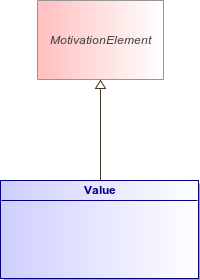
ArchiMate Metamodel
Value may apply to what a party gets by selling or making available some product or service, or it may apply to what a party gets by buying or obtaining access to it. Value is often expressed in terms of money, but it has long since been recognized that non-monetary value is also essential to business; for example, practical/functional value (including the right to use a service), and the value of information or knowledge. Though value can hold internally for some system or organizational unit, it is most typically applied to external appreciation of goods, services, information, knowledge, or money, normally as part of some sort of customer-provider relationship.
A value can be associated with all core elements of an architecture as well as with outcomes. To model the stakeholder for whom this value applies, this stakeholder can also be associated with that value. Although the name of a value can be expressed in many different ways (including amounts, objects), where the "functional" value of an architecture element is concerned it is recommended to try and express it as an action or state that can be performed or reached as a result of the corresponding element being available.
